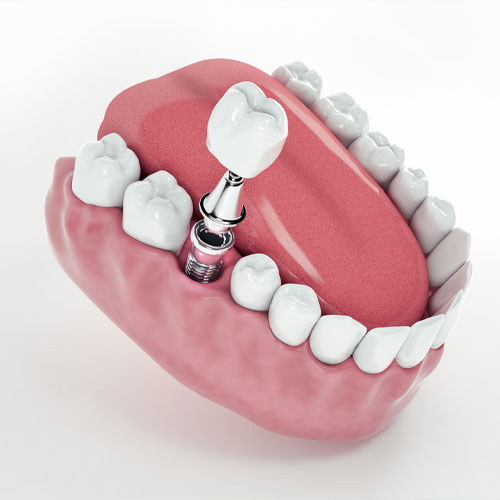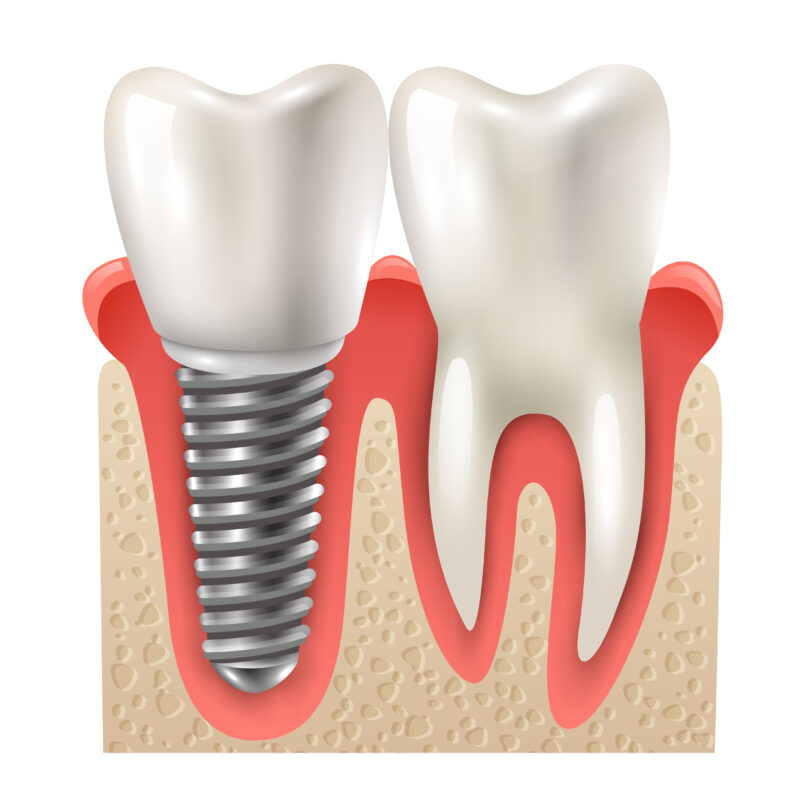Implant Tooth Application
It can be described as the process of placing an artificial root into the jawbone (tooth screwed into the bone or screw tooth) to replace a tooth that is not in the mouth. When the right planning is combined with the right application, implantology appears as the most accurate solution method as a method of completing missing teeth artificially.
Perfect Fit
While these artificial tooth roots, called implants, are produced from different materials, titanium, one of these materials, is considered the most suitable material for dental implants. Titanium implants, which will serve as artificial tooth roots, are perfectly compatible with bone tissue and show high resistance to intraoral forces.
Due to their high biocompatibility, titanium dental implants can be applied to previously lost
tooth cavities, as well as into the bone after tooth extraction without wasting time with the immediate implant, i.e. immediate placement protocol.

Healthy and Comfortable
The aim of implant dental treatment is not only to close the gaps, but also to restore comfortable
chewing, comfortable speech and aesthetic dental appearance. When there is sufficient bone level, dental implants can be placed in a single session with simple interventions. If there is not enough bone level and density, it can be expected to reach the optimum level with bone powder applications. Fixed prostheses, removable prostheses or hybrid prostheses can be applied on dental implants placed in the jawbone.
The placement of each implant is approximately a half-hour operation and it is necessary to wait
3-6 months for the superstructure (prosthesis) planned to be made on it.
Stages of Implant Treatment
The first stage in implant treatment is the diagnostic phase. Soft and hard tissues are evaluated
with 3D tomography imaging methods in terms of quality, quantity and the need for tightening. An evaluation considering tooth positions plays an important role in the tightening decision.
The implant must be placed in the correct anatomical position without disturbing the surgical and
biological principles. The next step is whether implant loading should be delayed or performed immediately. In the restoration phase, success can be achieved by ensuring the forms, sizes and positions of the teeth that have been agreed and approved in advance. By understanding and following these principles, one can predict which treatment will result in a successful outcome.
Who can receive implants?
It can be applied to people aged 18 and over who have completed their jaw development.
Who is not eligible for implant treatment?
Individuals 18 years of age and younger. Implant treatment should not be applied to uncontrolled
diabetics. In patients with high levels of glycosylated hemoglobin in the blood, the success of
fusion of implants with bone decreases. It should not be applied to patients who have recently
undergone radiotherapy from the head and neck region.

How should oral care be after implant treatment?
After the implant procedure, oral and dental care applied by the patient is as important as the correct orientation and medication. Oral and dental care should be applied as recommended by dentists to prevent infection of the wounds on the gums and jaws during treatment.
Oral and dental care should not be understood as just brushing the teeth. Oral and dental care includes the things you should do as well as the things you should avoid. Here are the issues you should pay attention to in oral care after the implant procedure:
- Do not eat or drink anything in the first 2 hours following the treatment.
- Avoid extremely hot or cold foods that can cause hypersensitivity.
- Do not smoke or drink alcohol for one day after the operation. In the following period, it is recommended not to smoke until the implanted area is completely healed.
- Contrary to popular belief, teeth are not brushed or mouth rinsed with solutions on the day of the procedure. However, at the end of the 36-hour period, you can start rinsing your mouth with special mouthwashes or appropriate saline solutions. It is recommended to do this twice a day for one minute for the first 15 days.
- Antibiotics or painkillers prescribed by dentists should be used as recommended.
- Swelling under the eyes or on the cheek and bruises caused by hematoma, which is the result of bleeding accumulated in the tissue, are expected to disappear within 10 days. However, ice can be applied at intervals not exceeding 10 minutes at a time on the first day to accelerate healing.
- The stitches that can be absorbed during the procedure are expected to dissolve spontaneously within 2 weeks. Non-absorbable stitches should be removed at the end of one week by the dental polyclinics performing the procedure.
Is there pain during and after implant treatment?
Local anesthesia is used during the application of the implants and the patient does not feel any pain. Following the operation, if adequate care is taken and medications are used regularly, a very comfortable healing process is experienced. Many patients report that the pain after the implant operation is less than the pain after tooth extraction.
How long does an implant last?
People who have implants expect these artificial roots to be in the mouth for life, although this idea is partially true, it should be known that the life of a dental implant will actually be as long as a healthy tooth. In other words, we may have teeth lost due to tooth decay or gum disease, as well as gum disease around the implant. Just as we can keep our teeth healthy by taking daily care to protect our teeth, we should also take care of the dental implant and take good care of our implant under the control of your doctor, especially oral hygiene. Well-made implants can be used for a lifetime when these issues are taken into consideration.
Can implants be placed immediately after tooth extraction?
Implants can be placed immediately after tooth extraction in appropriate cases. Although the
shorter treatment time provides great comfort for the patient, the number of roots of the extracted tooth, the shape and size of the extraction socket, the gingival and bone support around the extraction site, the presence of an acute infection and the primary retention of the implant when placed in the bone are carefully evaluated when making this decision.
How Much Are Implant Teeth Prices?
Implant tooth prices vary according to the treatment process to be performed. The materials used
in the treatment are the biggest factor in determining the price.
Implant tooth prices vary according to whether the material used is zirconium or titanium. Since
zirconium implants are up-to-date technology and much healthier, they can be priced higher than others. For this reason, it should be taken into consideration that the materials to be selectedduring the treatment process will directly affect the total cost.

It is also very important to pay attention to the dentist’s recommendations during the implant
dental treatment process. Incorrect procedures performed during the process may cause the implant to fuse incorrectly, causing the entire treatment to be redone.